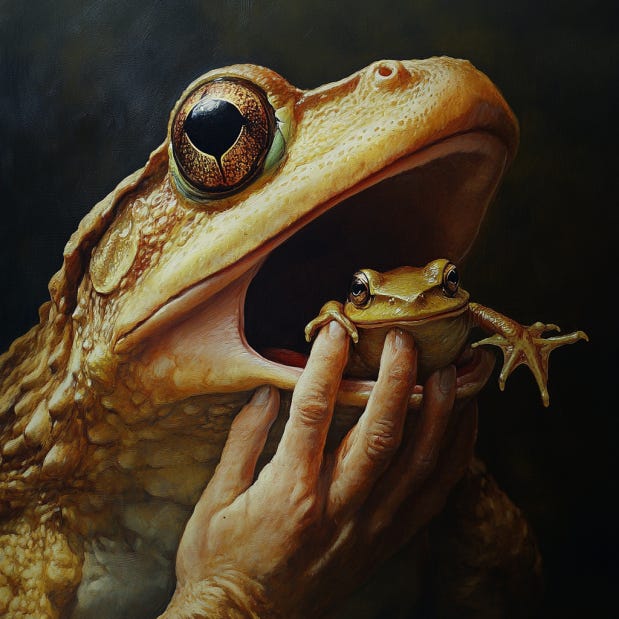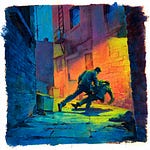This is an ideal moment to engage in a time-honored tradition of cobbling together a list of things I learned this year as a sort of reflective exercise, and spit it back at you in the hopes you get some value from it.
If this seems cynical, it’s only because I’m mirroring the sort of pessimism writers usually exhibit about well-worn artistic formats. All creators want to be at the coalface of creation, to be making original pieces that reflect their inner uniqueness. The truth is a little more mundane; these moments of brilliance are always brief, mysterious pauses between a stream of regular practice. That doesn’t mean they’re not useful. Life is mundane. And that’s ok. Same with lists.
Here is what I learned in 2024 about work, love and writing.
Work
I read two books who’s messages grasp the paradox at the heart of work. One of them is Eat That Frog! by Brian Tracey. Tracey’s message is one of genius simplicity; train yourself to do the hardest thing you have to do every day, first thing in the morning. Obviously the idea has more finesse than just that, like figuring out what the most important thing is (hint: it’s the thing that causes you the most anxiety when you think about it), but the base message is powerful.
We all face moments when we stare into whatever project or task demands our attention and slink away toward an easier one, or start telling ourselves we need a new job or calling. Sometimes, we might even be right. Usually, we’re just avoiding something. Mired in ambivalence about my work, I found that by - gasp! - facing my fear and merely Doing The Thing has a tremendous power, even creating its own momentum that carried me through the year and ended on genuine high notes.
On the other side of this tightrope is Oliver Burkeman’s 4000 Weeks: Time Management for Mortals. Burkeman’s thesis, developed from his day job as a time management guru, is that the fear Tracey conquers with doing work has a gentler, deeper, human side; that we are finite beings often living an absurd theatre of productivity to stave this reality off. When we lose sight of our finitude, we risk straying into the delusion that, after doing all of this work, we might eventually arrive at a place free from the unfinished demands of life. This will never be the case. Existence is irrefutably messy and incomplete. No magnitude of achievement will ever change this, so we may as well embrace it.
The skill I began sharpening in 2024 and will hone further in 2025 is learning to occupy these tensions. I am, perhaps, a Burkeman guy first and foremost. I write about the virtues of play and laziness. But I’ve also learned the work I put out into the world has a way of teaching me about it. So I have to do the work and summon the sort of discipline Tracey advocates for. Knowing when to shut up and work, and when to work to shut up is the compass I’m developing.
Love
2024 was the year I became more aware than ever how important love was to my life. If this sounds like a strange thing to declare, you’re absolutely right. Somehow, it feels both supremely obvious - love is borderline banal in its ubiquity, partly because it might be the most overused term in the English language - but also revolutionary to say out loud. Perhaps it’s because I’m a guy, and there’s a giant conspiracy that tells guys love is a luxury to be enjoyed in the evenings after work and when you get lucky.
Once I realised this, it felt like the dumbest unspoken covenant western society concocted. As a man, I was taught love - romantic, familial, dutiful - isn’t essential to who we are. The mission is the first thing, love the provenance of your spare time and women. This is backwards and stupid. Men have lakes of love to give. Oodles. We are bursting at the seams with all kinds of love, but the giant societal conspiracy told me my whole life to parcel it out like Soup Nazi. Maybe I’ll do a post about this soon.
A complication stems from love’s definitional mushiness. English has one word for love, which makes it hard to distinguish its finer points and understand the role it plays in various contexts. Sanskrit has 96 words for love, which might be a bit ambitious for our simple English ways. Let’s go for ancient Greek, who had eros, agape, philia, and storgé. Eros is romantic, carnal love, storgé fondness for family and pets, and philia the affinity for friends or even certain activities and vocations. I like agape, which was the sort of unconditional, universal love hippies espoused in the summer of. As these varied definitions show, love is muscular, and shows up all over the place. It really is ubiquitous. Only recently did I take this ubiquity seriously. If you let it, love is abundant.
Another problem is that because love is the chime of connection, it tends to go hand-in-hand with fear and grief. Fear and grief are what happens when connection is severed. To quote James Hollis (and you should click this link and buy his book right now) “within every man lies an ocean of tears.” Yikes. Reflecting on the many ways I can disconnect from life - games, phones, drugs, an infinite pool of incredible distractions - I’ve only begun to realise one of the reasons I write so much about disconnection is because I so urgently want to reorient around its opposite.
All of this is to say that in 2024 I learned how to love better than ever before; but it’s a muscle and requires constant practice and refinement. I’m catching up on behalf of the species for 2025 and beyond.
Writing
I write a lot about writing. Writers are fairly self-obsessive (and will, by the way, sell you out for their material, as Joan Didion warned), and most of my readers aren’t writers either. Writing, though, is just a practice, and creative practices are universal.
This is because every human being is born expressing itself. Though our self-expression might rhyme with others, your ideosyncracies are a once-in-a-universe event. Your genetic makeup craves it’s own fulfillment and seeks its own ends, finding form in your work, your leisure, even the way you rest. Writing is just what I do to find out who I am.
It’s work to write, no doubt, but it’s also a form of love. I’m trying to reach out to you through these words. And as much as I’d like to pretend I’m an island, when one of you tells me something I wrote resonates, I feel great. I feel connection. It’s grossly selfish in a way; not only do I sell you all out for material in these pages, but I do it to fulfill my own ends. There’s nothing noble about any of this. Perhaps the best I can hope for in 2025 is that work and love find more common ground in my writing.
I’m terrible at setting goals. I believe that if you have the right habits, things tend to take care of themselves. Life is far more interesting when you set a course and let the waves roll over you. I’m learning to be still in this frothy chaos and trust that doing my work from a place of love will lead me to fascinating places.
Enjoy the new year. Set your course, be still in the froth.
Love, Hoysted.

















Share this post